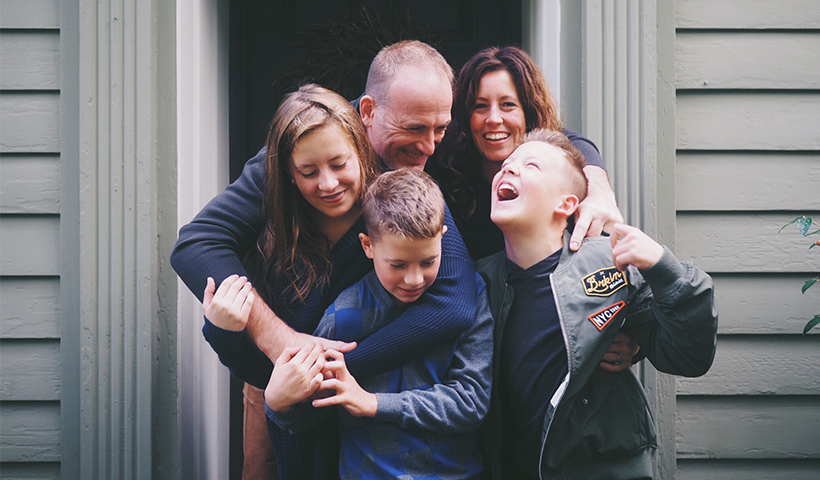How to manage your budget in a blended family
Tips and advice to help you manage your stepfamily's budget.
According to the latest Canadian Census (2016), about 12% of Quebec families are blended families. However, money is often a sensitive topic in relationships, and moving in with a new partner and children from previous relationships comes with its share of challenges! Fortunately, there are several solutions to ensure financially fair conditions for everyone. Three couples in different situations have agreed to share their experiences in managing their budget within a blended family.
One size doesn't fit all
Every family is different, so it's important for you and your spouse to consider your values and financial means to find a solution that works for you. There are quite a few options: splitting expenses fifty‑fifty, dividing them based on income or number of children, sharing or not sharing resources—anything is possible! It's up to you to find the best system for your family. To help you get started, here are some reflections from three blended families who have found their own winning formula.
Julie and Martin: Sharing expenses and maintaining financial independence
Julie and Martin, both in their thirties, moved in together about three years ago. A year ago, they had a little girl. Martin already had a daughter, nine-year-old Mila, from a previous relationship. The couple splits their finances fairly, made easier by the fact that their incomes are about the same.
We share all day-to-day expenses equally: rent, electricity, groceries, drugstore purchases, daycare for our daughter, and so on. As for Martin's daughter, he and his ex‑wife take care of necessary expenses like clothing, school supplies, and day‑camp fees.
Martin and Julie each have their salary deposited into a separate bank account. They use a shared credit card to pay for family expenses. At the end of the month, they add up their expenses and calculate what they owe each other using the Splitwise app, a process that takes only a few minutes. The solution was a natural choice, one that they felt wouldn't leave anyone feeling wronged and would allow them to maintain some autonomy. As for their leftover income—any funds not used for family or shared projects—Martin and Julie are free to use it as they please. For instance, they can put the money into their RRSPs or use it to treat themselves. "I don't want to have to justify it every time I buy myself new clothes, for example. My partner is a musician, and he can buy himself new instruments. We each have our own interests and we don't judge each other," she says. Her advice to other blended families? Be sure to communicate and establish a system that everyone is comfortable with. "Some of our friends think we're making life more complicated, but I disagree. For me, financial independence is paramount, and this method lets me preserve it," she says.

Roxanne and Antoine: Pooling resources
A year and a half ago, Roxanne and Antoine, both in their forties, decided to buy a house for their small family. They live with Roxanne's 14‑year‑old son and have shared custody of Antoine's 9‑year‑old daughter. "We make the same amount of money, even though I'm self‑employed and my partner is on a salary. We deposit our earnings in a shared account that we use for all our personal and family expenses. This suits us perfectly, because we don't take a dollar‑for‑dollar approach," says Roxanne. The couple also opened a high‑interest savings account and contribute to it regularly, with amounts varying depending on what each person can afford. Once a year, they divide up these savings and transfer them to their individual RRSPs.
Day-to-day expenses for the kids are shared equally, since, according to Antoine and Roxanne, they end up spending the same amount. There are some exceptions, though, such as the fees for Antoine's daughter's orthodontics, which are split fifty-fifty between Antoine and the girl's mother. Since Roxanne has sole custody of her son, she takes care of all of his expenses. As an accountant and financial planner, she is well versed in money matters and is comfortable discussing them with her partner. "For us, it's important that we're able to treat ourselves without having to ask the other person for permission, except when it comes to big purchases. We also agreed that if one of us starts feeling like we're being treated unfairly, we'll try a different system, like separate bank accounts," she says. What will happen to their property when they die? "We'll each leave our share of the house to the surviving spouse, and the kids will inherit our savings," says Roxanne.

Maria and François: Fairness comes first
Now in their early fifties, Maria and François have lived together for two years. Maria shares custody of her two kids, aged 10 and 14, with their father. François doesn’t have kids of his own. "We see ourselves as a team, and we communicate openly. We wrote down all of our recurring, fixed, and variable expenses and took into account our personal situations to determine the monthly amount we would each pay," she explains. For example, because Maria has two kids and is the owner of the family's home, she pays a larger share of the grocery and mortgage bills.
"When we do activities as a family, I pay for the kids and François takes care of his share. However, he often pays for extras such as restaurant meals," says Maria. Because Maria's marital status changed when François became her common-law partner, she has seen a drastic reduction in her family allowances over the past year. "Fiscally, the situation is unfair and I'm losing a lot of benefits. But my partner shouldn't have to suffer for it because they're not his kids," she says. Maria and François keep separate bank accounts, and Maria shares essential expenses for her kids (school, sports, clothing, and so on) with their father. She and François sought the advice of an expert to find an arrangement that worked for both of them, something Maria believes was a great way to prevent tension about money in the relationship.
It's important to remember that, for tax purposes, you could be considered common‑law partners (in French) if you've lived together for 12 months or have a child with your partner. In that case, you might lose or see a reduction in certain government benefits that are calculated based on family income rather than individual income. This could affect your budget, especially if, like Maria, you're paying for your children's expenses on your own. Do your research!
Every blended family is unique and needs to find the solution that's right for them. Of course, any plan you make should be flexible and can be adapted to suit changes in your family's situation, such as the birth of a child or the purchase of a home. Our three couples all agree that one of the secrets to success is being honest about your expectations and values from the very beginning of the relationship. That way, you won't have any unpleasant surprises once everyone is living under the same roof!
